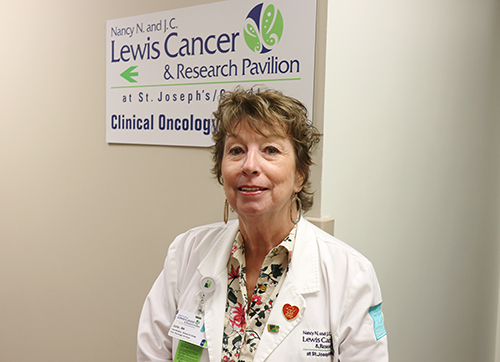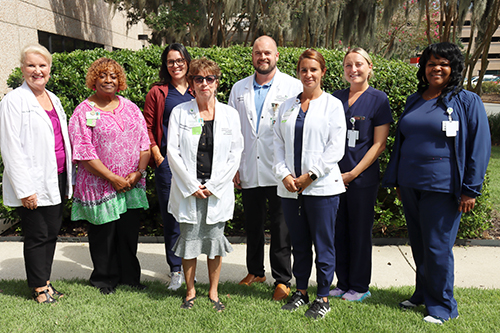Clinical Trials Close to Home, part 1: What is the role of the research coordinator?
Cancer
The Lewis Cancer & Research Pavilion has a dedicated team to help cancer patients on clinical trials navigate their journey
If you get diagnosed with cancer and are eligible and commit to participating in a clinical trial, at the Nancy N. and J.C. Lewis Cancer & Research Pavilion you have an extra team of healthcare workers on your side.
At the LCRP, we have dedicated research clinical coordinators that are with clinical trial patients every step of their journey, similar to our nurse navigators that work with cancer patients who are not on a clinical trial.
Longtime nurse Julie Heintz is one of them, who’s been with the research team for more than five years now.

“I love what I do. I have patients that are on cycle 30, so we’ve been friends for a long time now – three, four, five years. You do build a bond with that,” Heintz says. “Cancer is difficult enough. My job is to try to make that journey as easy as I can and be hopeful.”
“You have your defeats but you also have your victories. The overall end point is survival, and we just love to hear that bell ring.”
(At the LCRP, we have a bell for patients to ring to symbolize and celebrate when you are done with your treatment.)
About clinical trials
One of the research coordinator’s roles is educating patients about clinical trials. Many patients do not even realize the LCRP offers clinical trials, Heintz says, so the education starts there.
A clinical trial is a research study that involves patients and helps doctors and researchers find new ways to improve diagnosing, treating and preventing diseases, while also improving the quality of life for people with diseases. In clinical trials, researchers methodically test drugs, medical devices, screening approaches, behavioral modifications and other interventions.
Search our clinical trial database
Clinical trials are used to answer many different clinical questions, furthering screening and treatment options to help you stay healthy and get better sooner. By offering clinical trials at the LCRP, you can get the latest treatment and help further cancer research in the comfort of your own community.
“I think an important piece about us is we have this community cancer center where you can get world class care here just as well as other institutions,” Heintz says. “Granted, bigger institutions might offer more trials, but if you are in a clinical trial here that is offered somewhere else, you are going to get the same care as if you went away. It’s nice to be able to offer this kind of care for our community so you can stay home and not have to travel that far and have those added expenses.”
The LCRP works with a number of national, state and regional partners to offer patients access to the latest trials available. You can be assured patient safety is always top priority. All trials are administered according to protocol and are closely regulated. At St. Joseph’s/Candler, we only offer phase 2 and phase 3 clinical trials, so our trials have been tried and tested through phase 1 and wouldn’t be moving on if the data didn’t show promise, Heintz says.
“Every patient always gets the standard of care in treatment. For example, if you are being treated for endometrial cancer, if you were to go to Miami or Maine, you’d get the same treatment as you would here,” Heintz explains. “What makes the trial different is there’s another piece to it. You may have an additional drug added, and the clinical study trial sees if adding that drug is better, worse or indifferent to that standard of care.”
About our research coordinators

The LCRP’s team of research coordinators includes both registered nurses and researchers. All are specialty trained to work in the research department. They work very closely with the principal investigators – the oncologists, radiation oncologists, surgical oncologists – assigned to the trial. For example, Heintz works with clinical trial patients who have a gynecological cancer so she works very closely with Dr. Sarah Gill.
If Dr. Gill or an advanced practice provider in her office identifies a patient who may be eligible for an open trial, Dr. Gill and Heintz will speak to the patient about the trial. Heintz will go over the pros and cons, and if the patient is interested, make sure they meet all the trial’s requirements and get them started on their cancer treatment journey.
“We go through the journey with them from the moment they step in the door,” Heintz says. “A very important part of our job is coordinating care for the patient and their family.”
(Pictured above, left to right: Diane Hinely, Patricia Sharpe, Stephanie Smith Reyes, Julie Heintz, Elijah Paradee, Denell Foster, Samantha Grantham and Tanisha Cameron)
The research coordinators handle each patients’ schedule. They attend appointments with them, go to scans with them and make sure lab work is up-to-date and done before treatment. They make sure images are uploaded correctly to a specific software and lab work is mailed correctly to the investigating facility.
They help with emotional support, so for example if you hair falls out or you need a prosthetic, they can help with that as well.
“Cancer care has come a long way and a lot of that is because of clinical trials. Think about the standard of care now, that was once a clinical trial,” Heintz says. “It’s sort of philanthropy in their own way of giving back, and I think they have a rewarding feeling about that.”
If you are recently diagnosed with cancer and interested in a clinical trial, talk to you doctor about what you may be eligible for. You can also search our database of currently open trials.